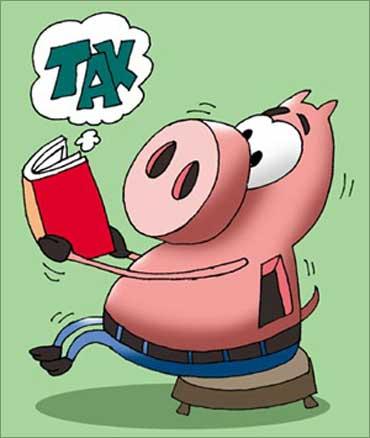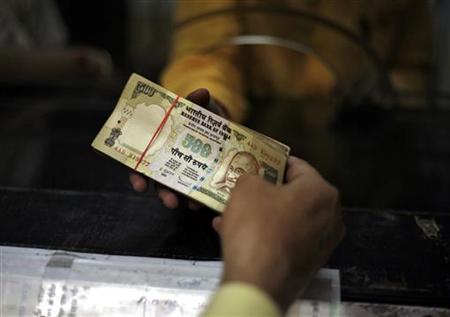Photographs: Uttam Ghosh/Rediff.com. Priya Nair
It's one annual communication from the human resources department that most employees dread. That hard-nosed letter asking whether you have actually made the investments you had 'promised' during the start of the year.
For many, the rescue comes from banks, mutual fund houses and insurance companies that are hawking tax-saving products. But before you jump to invest for the purpose of saving tax, check if you really need to do it.
For instance, many senior executives who come under the highest income tax bracket are unlikely to get any benefit under Section 80C because their employee provident fund (EPF) might have crossed the Rs 1 lakh limit for tax-saving investments.
So, buying insurance or mutual funds will not help save any extra tax.
"Over the years, PPF (public provident fund) and ELSS (equity-linked savings schemes) have emerged as popular tax saving instruments. However, they are also subject to certain lock-in periods," says Parizad Sirwalla, partner at KPMG India.
...
What you must do to save taxes
Photographs: Uttam Ghosh/Rediff.com.
ELSS or RGESS: ELSS or Rajiv Gandhi Equity Savings Scheme (RGESS) is a good option for those who have not exhausted the 80C limit, despite being in the highest income tax bracket.
While the latter is meant only for investors with taxable income of Rs 10 lakh, the benefit is nominal as well – just Rs 50,000. While the benefits under ELSS are likely to go away once the direct taxes code (DTC) is implemented, one could still use it for this year.
The entire amount will give tax benefits. Nitin Vyakaranam, founder and CEO of ArthaYantra, says, "An individual with high risk tolerance can consider ELSS or RGESS. The investment instruments should be treated based on their merit, rather than their returns.
For instance, in the past five years, ELSS has not given good returns. But historically, equities have always fetched good returns in the long term."
With a Rs 100 entry load for investing more than Rs 10,000 and expense ratio of 2-2.5 per cent, ELSS is a good option.
The only drawback: lock-in for three years. But since the capital gains tax is zero, there will be no tax on returns. While RGESS was introduced only this year, ELSS, being an equity scheme, can return an average of 10-12 per cent in the long term.
...
What you must do to save taxes
Photographs: Uttam Ghosh/Rediff.com.
NPS: The New Pension Scheme (NPS) is gaining in popularity. And one wishing to have exposure in equities can use this scheme. Yet, it is not very aggressive.
NPS allows fund managers to invest only in index (50 per cent is the limit) funds. So, it is safer than direct equities from an investment perspective. It is the cheapest way to get exposure in equities as well.
Last year, NPS delivered an impressive average of 9.33 per cent. According to Piyush Seth of Plan Invest Advisors, those who fall in the highest tax bracket can afford to invest in mutual funds (other than ELSS) and stocks, as there is no long-term capital gains tax if held for over a year.
...
What you must do to save taxes
Photographs: Uttam Ghosh/Rediff.com
FD or Post Office schemes: These are a debt option to save taxes. The good part about these schemes is guaranteed return, compared to equity products.
At the same time, they come with lock-in periods, at times longer. For instance, the most popular tax-saving option, PPF, comes with a minimum lock-in of six years, NSC has a lock-in of two years, and a tax-saving deposit locks your money for five years.
Analysts suggest PPF to most individuals because it helps save a good chunk for retirement. Besides, the interest income this avenue earns is completely tax-free. However, interest income from both NSC and a tax saving bank deposit is taxable at the slab rate.
Since April 2012, PPF has been giving 8.8 per cent, while NSC gives 8.60 and the State Bank of India's tax-saving deposits offers 8.5 per cent for deposit maturing any time between five and 10 years.
...
What you must do to save taxes
Photographs: Uttam Ghosh/Rediff.com.
Life insurance
Vyakaranam says insurance has for long been the front runner whenever investments regarding tax savings. However, buying excessive insurance defies its purpose and leads to the investor holding unnecessary products. It is best to avoid insurance if the aim is only tax saving.
Term insurance or pure life insurance plans are better than endowment and unit-linked plans (Ulips). If you do not have an insurance cover and would like to save taxes, these should be the first avenues to put your money in.
And, you should always buy life insurance early in life if you have dependents. Investment-cum-insurance plans also offer tax saving but due to high costs, these work out more expensive than other market-linked instruments.
...
What you must do to save taxes
Photographs: Reuters.
Principal repayment:
Instead of investing in different instruments that might not be useful for you and your portfolio, you could claim for prepaying and repaying your housing loan. Unfortunately, there is no separate deduction for this purpose.
...
What you must do to save taxes
Photographs: Uttam Ghosh/Rediff.com
To save under Section 80D:
Health Insurance: Buy a comprehensive health cover if you haven't bought one. It will not only save hospitalisation cost at a later date, but also give an additional tax exemption of up to Rs 15,000 yearly per person, if you are paying for a cover for yourself.
In case you are paying towards a health insurance bought for your parents, then you can get an exemption of up to Rs 20,000 annually for each parent. If you are incurring expenditure for the treatment of a handicapped dependent, then you can claim a deduction of Rs 50,000 or the expenses incurred, whichever is lesser, under section 80DD.
For severe handicap conditions, the deduction limit is enhanced to Rs 1 lakh. And, you can claim tax relief under Section 80D and Section 80DD separately.
...
What you must do to save taxes
Photographs: Uttam Ghosh/Rediff.com.
To save under Section 24:
Interest repayment for home loan: Although you have to club the principal repayment for a home loan in Section 80C, there is a huge respite in the form of separate deduction for interest repayment, the larger chunk of your home loan. You can claim for repaying interest up to Rs 1.50 lakh in a year.
If you are repaying interest towards a home loan for an under-construction property, you cannot claim for interest paid during the under-construction period. However, after taking possession, you can claim the interest paid during the under-construction period for four years or until you get tax benefit for the entire interest paid, whichever is earlier.
And if you are repaying interest for a second or third property, there is no upper limit to the amount of interest you can get tax exemption for.










article